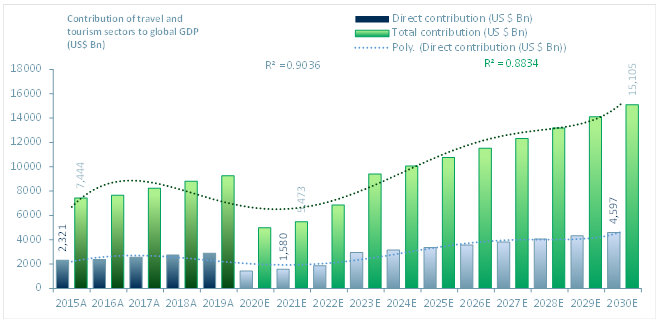VCI – future leisure and transport depend on it
The Vaccination Credential Initiative (VCI), a global healthcare and tech sector initiative is creating the healthcare related ‘Digital vaccination passport’. VCI type initiatives have raised global awareness, stretching from research analysts and transport and leisure investors to governments and the general populous.
From an investment research perspective, the transport and leisure sectors need a ‘post-Covid’ solution, and it probably needs to be radical.
- The VCI project has brought Microsoft (NasdaqGS:MSFT), Oracle (NYSE:ORCL) and Mayo Clinic (US healthcare non-profit), amongst others, into a ‘healthcare sector’ alliance. The two tech giants and the non-profit plan to create a standardised system that verifies peoples’ Covid-19 vaccination and testing results status.
- VCI’s ultimate goal is an internationally accepted digital certificate. The back bone of its development is The Commons Project Pass, already in use since October 2020.
- In the US, healthcare sector IT companies, like Epic and Cerner help with providing vaccination information from electronic medical records. These will be added to a ‘hybrid’ digital card or wallet.
- It is expected that each country will have its own guidelines as to which Covid-19 vaccine(s) and test(s) they accept. It seems probable the VCI ‘digital passport’ programme can also encompass events, universities and workplaces.
- In the UK, there is already a pilot health passport system in development by two companies from the healthcare and tech sectors funded by the UK government – Biometrics firm iProov and Cyber Security group Mvine.
Returning to pre-Covid norms is going to be challenging and time consuming for most sectors. Yet the healthcare sector’s remarkable success in developing and delivering vaccines at speed has made the pandemic journey less frightful.
Among the worst hit sectors by the Covid-19 pandemic have been transport and leisure. Obviously, these two sectors will also face the most obstacles to their recovery.
From an investment research perspective, convincing investors that transport and leisure can deliver high EVA (economic value added) from the fresh capital they will require to reinvigorate themselves will be a major challenge. Without a health passport we assess that it will be close to impossible to make a positive investment case for mass cross boarder leisure and transport sectors.
One somewhat controversial approach for a health passport would include the insertion/injection of a healthcare chip under the skin. This is already common practice for companion animals and valuable livestock (which is probably part of the problem in the minds of many people). There are also some testy liberty and privacy issues to consider and reconcile.
If, for a moment, we consider that liberty, privacy and adoption issues could be solved, then the positive implications for the transport and leisure sectors, and the collaboration and consequent EVA margin generation possibilities between other sectors, are far reaching given the scale of the issue and the 9 billion people on the planet.
We can envisage the semiconductor, healthcare, healthcare IT and telecommunications sectors creating further alliances to deliver a subcutaneous chip-based solution.
From an investment research perspective, such innovation driven ecosystems are attractive to investors because there is a strong correlation between R&D or innovation and high EVA margins.
For investment research analysts and portfolio managers high EVA is correlated with a greater return on invested capital (RoIC) through share buy backs and or dividends and improved capital stewardship by company managers (something ESG also enhances).
High EVA margin firms also tend to outperform low EVA margin firms on other investment research metrics too – this may be because high EVA margin (and high ESG performing) firms generally do a lot more R&D than their competitors.
The reason we argue that the transport and leisure sectors must be provided with the tools to make a case for capital in exchange for high EVA margin, is that without these sectors in their pre-Covid form, the damage to global GDP growth is sizeable.
According to the World Travel and Tourism Council (WTTC), the ‘direct’ contribution of travel and tourism to global GDP amounted to just under US$ 2.893trn in 2019. The total contribution (direct plus indirect) of travel and tourism to global GDP for 2019 is estimated at US$ 9.258trn.
ACF’s investment research team expects the contribution to global GDP from the travel & tourism industry to have dropped by more than 50% in 2020 and we only expect a full recovery by 2023E if an effective vaccine passport is agreed globally.
From 2024, ACF’s investment research forecasts suggest a net return to GDP growth share in the transport and leisure sectors. By way of a proxy, we forecast a steady rise in the direct contributions to global GDP from both travel & tourism reaching US$ 4.6trn by 2030, based upon a bounce back distorted 10-yr CAGR of 12.45% for travel & tourism’s direct contribution and 11.75% for the total contribution.
Our bounce back 10-yr CAGRs compare to the pre-pandemic 5-yr CAGRs for direct of 5.66% and total contribution of 5.60%. Our far higher forecast growth rates of 12.45% and 11.75% are due to the distorting bounce back or V-shaped recovery we expect through 2021-2023E for the travel & tourism sectors.
ACF investment research forecasts also assume that technical innovation from the healthcare and IT sectors in particular plays a key role in the transport and leisure sectors. If our assumptions turn out to be correct our proxy subsectors travel & tourism total contribution to global GDP might touch ~US$ 16trn by 2030 based upon a total contribution 7% CAGR 2024-2030E (as per exhibit 1 below).
Exhibit 1 – Contribution of travel and tourism to global GDP 20 15A-2030E
Sources: ACF Equity Research Estimates; WTTC
A digital vaccine passport system looks like a gateway towards a pre-Covid normality. In order for the vaccine passport to work it will need global political and public endorsement – this will be an extraordinary challenge.
Over the long term we suspect the consent challenge will be overcome, and eventually it seems inevitable that a health care passport will simply become an element of any passport for international travel – fully integrated into the usual identification passport document using chips in the document and in the person.
Further Covid variants are inevitable and there is a great likelihood that vaccines will need to be re-formulated annually to remain effective. In this set of circumstances, without fundamental cultural changes and or innovation, the transport and leisure sectors will exist in an economic purgatory.
Without a health wallet proving vaccination status, transport and leisure, as we know them now and knew them pre-Covid, will simply fade away. The world will be poorer in very many ways both figuratively and financially without strong transport and leisure sectors and VCI or a version of it is key to their revival.
Authors: Anda Onu and Christopher Nicholson – Anda is part of ACF’s Sales & Strategy team, Christopher is ACF’s Head of Research and MD. See Anda’s and Christopher’s profiles https://acfequityresearch.com/team/

















